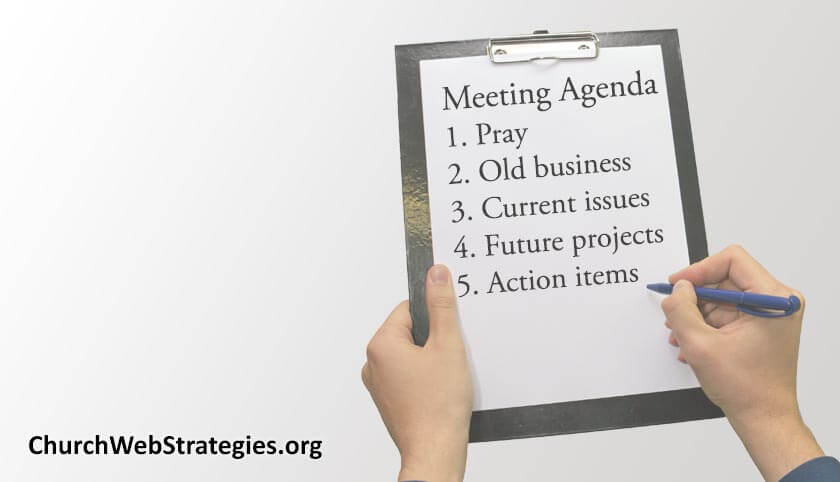In a previous article, I talked about who should be part of your core website team for your church. Yet what should you do once you all get in the same room together? The first few meetings will probably involve creating the church’s overall web strategy, which connects your business goals with how the website will help you obtain them. Subsequent meetings will involve more tactical objectives, including individual projects. But the key to obtaining and eventually measuring success will based on how disciplined you are with both your discussions and documentation.
So you already know who to invite to your meetings, but what topics should you cover in your meetings. Note that this for generic meetings, and special sessions should be called for high-level strategy discussion, brainstorming, and workshops. Once you get up and running, this agenda will be your standard format.
Preliminaries
Very few meetings start on time, and your church will be no different. While you wait for people to show up, take this time to enjoy side conversations and small talk. When everyone is present, I will again strongly encourage you to open with prayer; asking for wisdom, and the Holy Spirit to guide your actions.
Current Items
Discuss the status, successes, failures, and obstacles for all ongoing projects. This is not a blame or praise session; but where the various parties can update others and seek help. The pastor can help make a decision, the webmaster can showcase a new feature, and finance can be briefed on upcoming expenses. If you have had previous meetings, review the action item log and update it accordingly.
Future Items
This is not a brainstorming session, but time to plan future projects. Discuss what resources will accomplish them, potential timeframes they are needed or can be completed, and what the deliverables. If there are any foreseeable obstacles, see if you can mitigate them now. Log all future tasks in an action item log, with who is responsible, a short description, and the estimated due date. This will be revisited every meeting to help items from falling through the cracks, and hold parties accountable for delivery dates.
Closing
Before you break, ensure that everyone understands what tasks they are responsible for, and when they are due. Then before you get up from the table, thank God for a good meeting, fellowship, and the help in furthering His kingdom.
Records
Knowing all of these things is great, but keep a written record of all these things. Do not rely on just handwritten notes. Save your documents in a central location (try using Google Docs) or at the very least, E-mail them to everyone on the team. Keep a library of these for future reference; however the most important item will be your action item log. This shows the progress your team is making, and will keep you disciplined and on track with your project.
Action Item
Develop some templates for meeting minutes and your action item log, then start faithfully using them to document your team’s progress. Use these to highlight your successes, explain failures to, and ask for help from any higher councils or groups. Remember to keep prayer a part of your meeting structure and press onward to further His kingdom!
Photo courtesy of Kostya Kisleyko

